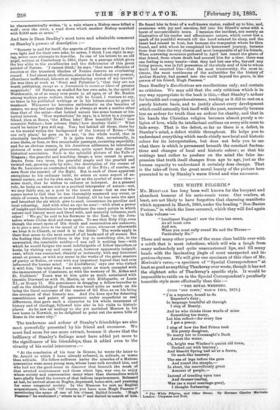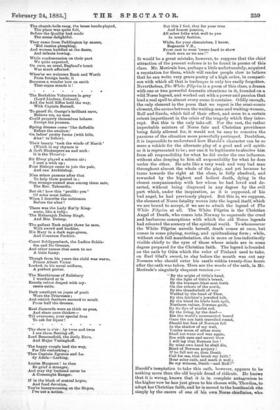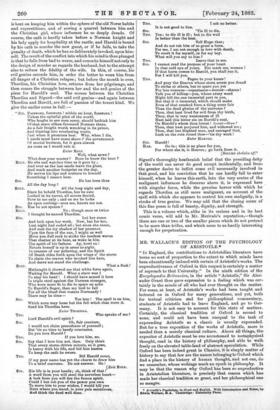THE WHITE PILGRIM.*
MR. MEarvALE has long been well known for the buoyant and abundant humour of his serio-comic verse. Our readers, at least, are not likely to have forgotten that charming manifesto which appeared in March, 1880, under the heading " Ben-Bastes Furioso," in which the lines occurred, which they will find again in this volume :— " Intelligent England! now the time has come,
As all must own And see,
When you must rally round Me and the Throne—
Particularly Me."
These and many other poems of the same class bubble over with a mirth that is most infections, which will win a laugh from many melancholy and quite unaccustomed lips, and fill many heads with the fascinating jingle of most unexpected and in- genious rhymes. We will give one specimen of this class of Mr. Merivale's verse,—a specimen of " Special Correspondence" at least as good as anything Thackeray ever wrote, though it has not the slightest echo of Thackeray's specific style. It would be.
impossible to rattle on in the Special Correspondent's peculiarly-
honorific style more effectually than this :—
" THE ROYAL WEDDING.
(VIDE THE TIMES,' MARCH 14TH, 1879.)
"I'm a reporter, bound to do Reporter's duty ; In language beautiful all through I sing of Beauty.
And he who thinks these words of mine Something too many, Let him reflect—for every line
I get a penny.
I sing of how the Red Prince took His pretty daughter, To marry her to Connaught's Dook Across the water.
Oh, bright was Windsor's quaint old town, Decked out with bravery ; And blessbd Spring had ne'er a frown, Or such-like knavery.
The sea of legs before the gate
And round the steeple,—
In short, the marvellously great
Amount of people,—
Instead of treading upon toes And dresses tearing, Was (as a royal marriage goes), I thought forbearing.
• The White Pilgrim, and Other Poems. By Herman Charles Meiivale: London Chapman and Hill.
The church-bells rang, the brass bands played, The place was quite full, Before the Quality bad made The scene delightful.
They came from Paddington by scores, 'Mid nudism ploughing, And women huddled at the doors, And infants bowing.
While condescension on their part We quite expected, On ours, as usual, England's heart Was much affected.
When'er we welcome Rank and Worth From foreign lands, it Becomes a wonder how on earth That organ stands it !
• • . •
'The Berkshire Volunteers in gray (Loyd-Lindsay, Colonel), And the bold Rifles hold the way, With Captain Burnell.
To guard St. George's brilliant nave, Believe me, no men Could properly themselves behave Except the yeomen.
Spring dresses came 'like daffodils Before the swallow,' On ladies' pretty forms (with bills, Alas ! to follow).
'Their beauty 'took the winds of March' (Which in my rhymes is A theft Shakespere an and arch : It is the Timea's)• Sir Elvey played a solemn air; I sent a wish up ; Four Bishops came to join the pair, And one Archbishop.
Nine minor parsons after that To help them poured in ; 'One strange-named man among them sate, The Rev. Tahourdin.
But oh ! how this prolific pen' Of mine must falter, When I describe the noblemen Before the altar !
'There was the Lady Em'ly King- scote, like a tulip; The Maharajah Duleep Singh, And Mrs. Duleep.
The gallant Teok might there be seen, With sword and buckler, His Mary in a dark sage-green, And Countess Packlar.
Count Schlippenbach, the Ladies Schlie- fen and De Granne, And other' names that seem to me A little fanny.
Though from his years the child was warm, Prince Albert Victor Looked, in his naval uniform, A perfect piotur.
The Marchioness of Salisbury I wondered at in Reseda velvet draped with my- osotis satin, Dark amethyst on japes of poult Wore the Princesses ; And ostrich feathers seemed to moult From half the dresses.
Beal diamonds were as thick as peas, And sham ones thicker—
Till overcome, your special flees To ask for liquor !
The show is o'er : by twos and twos I see them fleeting off, Lord Beaconsfield, the Daily News, And Major Vietinghoff.
'The happy couple lead the way, For life embarking ; Then Captain Egerton and La- dy Adela—Larking.
Louisa Margaret ! to thee Be grief a stranger, And may thy husband never be A Connaught Ranger.
If in the blush of mutual hopes, And fond devotion, You're honeymooning on the Slopes, I've not a notion. But this I feel, that for your true And honest passion, All sober folks wish well to you In manly fashion.
While, for your chroniclers, I know, Begnante VB., From east to west 'twere hard to show Such men as we are !"
It would be a great mistake, however, to suppose that the chief attraction of the present volume is to be found in poems of this class. Mr. Merivale has, perhaps a little unfortunately, acquired a reputation for them, which will render people slow to believe that he can write very grave poetry of a high, order, in compari-
son with which all that is burlesque is only too easily forgotten. Nevertheless, The White Pilgrim is a poem of this class, a drama with one or two powerful dramatic situations in it, founded on a wild Norse legend, and worked out with a power and passion that lend a real spell to almost every scene it contains. Oddly enough, the only element in the poem that we regret is the semi-comic element, the scenes between the waiting-man and waiting-woman, Rolf and Gerda, which fail of their effect, and seem to a certain
extent impertinent in the crisis of the tragedy which they inter- rupt. But this is the only take-off. For the rest, the rather improbable mixture of Norse fate and Christian providence being fairly allowed for, it would not be easy to conceive the passions of the situation more powerfully portrayed. Doubtless, it is impossible to understand how Harold's character can be so mere a vehicle for the alternate play of a good and evil spirit, as it is represen ted to be ; nor can it be legitimate to absolve him from all responsibility for what he did under the one influence, without also denying to him all responsibility for what he does under the other. He acts like a very weak and very bad man throughout almost the whole of the play, and yet because he tarns towards the right at the close, is fully absolved, and rewarded by the highest and holiest death, dying in the closest companionship with her whom he had loved and de- serted, without being disgraced in any degree by the evil part which, under the inspiration, as it is supposed, of his bad angel, he had previously played. But this is, we suppose, the element of Norse fatality woven into the legend itself, which we are bound to accept, if we are to admit the legend of The
White Pilgrim at all. The White Pilgrim is the Christian Angel of Death, who comes into. Norway to supersede the cruel and barbarous conceptions with which the old Norse legends had coloured the scenery of the spiritual world. To whomsoever the White Pilgrim unveils herself, death comes at once, but comes in some pitying, resting, and spiritualising form ; while, without such full manifestation, she is more or less indistinctly visible chiefly to the eyes of those whose minds are in some degree prepared for the Christian faith. The legend is founded on the oath by Odin which the ruler of Finland used to take, on Earl Olaf's sword, to slay before the month was out any Norman who should enter his castle within twenty-four hours after the oath was taken. 'Here are the words of the oath, in Mr. Merivale's singularly eloquent version :- " By the might of Odin's hand,
By the light of Odin's brand,
By the trumpet-blast sent forth.
On the echoes of the north, By the thunderbolt of war Welded by the hand of Thor, By this falehion's jewelled hilt, By the blood its blade bath spilt, Northern valour, Norman guilt, By its dye of scarlet red,
By the living, by the dead—
Ere the world's unmeasured bound Once the son bath travelled round, Should but foot of Norman fall In the shadow of my wall, Yonder moon of silver stain Shall not wane and wax again, Ere with sure and secret blow I will lay that Norman low !
By mine own band he shall die, Mead of Norman perjury ! If he fall not so, then Death Call for me, that break my faith !
Hear mine oath, and mark it well ; Be my witness, Death—and Hell I"
Harold's temptation to take this oath, however, appears to be nothing more than the old boyish dread of ridicule. He knows that it is wrong, knows that it is in complete antagonism to the higher vow he has just given to his chosen wife, Thordisa, to adopt her Christian faith, and he is moved to the heathenish rite simply by the sneers of one of his own Norse chieftains, who- is bent on keeping him within the sphere of the old Norse habits and superstitions, and of sowing a quarrel between him and the Christian girl, whose influence he so deeply dreads. Of course, the oath is hardly taken before a Norman knight and his lady apply for hospitality at the castle, and Harold is bound by his oath to murder the new guest, or if he fails, to take the penalty of death, which he has so deliberately invoked, upon him- self. The result of the conflict into which his mind is thus plunged is that he falls from bad to worse, and commits himself not only to the design of murder as regards the husband, but to the attempt also to seduce the fidelity of the wife. In this, of course, his evil genius seconds him, in order the better to wean him from all danger of a Christian relapse ; but before the month is over, Thordisa, his Christian love, returns from her pilgrimage, and then comes the struggle between her and the evil genius of the piece for Harold's soul. The scenes between the Christian Thordisa and Sigurd—the said evil genius—and again between Thordisa and Harold, are full of passion of the truest kind. We give the earlier scene in full :—
" SIG. Forsworn, forsworn ! within an hour, forsworn !
Unless the spiteful pilot of the world, Who laughs to see men sorry, should bethink him Of that same silken-favoured Norman there, As a fair freight worth wrecking in its prime, And blasting into everlasting waste, Just when it promises best. Why, when I die, I needs must have some share i' the government Of mortal business, for it goes almost
As cross as I would rule it.
Enter ROLF.
Well, what news ?
What does your master ? Does he know the hour ?
ROLF. He sits and watches time as it goes by ;
And ever as the last sands leave the glass, And mark another footprint on the day, He moves his lips and mutters to himself Something I cannot hear.
SIG. He has been thus All the day long ?
ROLF. All the long night and day, Since he beheld Thordisa, has he sate Locked in its turret, all access denied, Save to me only ; and on me he looks As upon nothing—sees me, knows me not.
SIG. Has he not spoken ?
ROLF. No ; though once or twice I thought he named Thordisa.
SIG. Let her come
And look upon her work. Now, but for her, Last night had ended all ; but since she came,
And cast the icy shadow of her presence
Upon the face of the sun, I might as well
Move you dull rock to strike the insolent waves
That chatter at its base, as wake in him The spirit of his fathers. Ay, bowl on !
Nature herself is up in arms to-night, In censure of our paltering, and the Spirit Of Death rides forth upon the wings o' the storm To claim the craven who invoked him here, And dares not stand the challenge.
ROLF. What a flash !
Methonght it showed me that white form again, Waiting for Harold. What a slave was I To stay his hand ! I should have armed it here In triple steel against the Norman stranger, Who were more fit to die to spare an ache To Harold's finger, than my lord to fall For all the blood that waters Normandy !
There may be time— SIG. Too late ! The spell is on him,
Which none may loose but the fell witch that wove it.
Send his Thordisa here.
Enter THORDISA. Who speaks of me ?
Lord Harold's evil spirit ?
Oh, fair creature, I would not claim precedence of yourself; Bnt 'tis no time to bandy courtesies.
Do you love Harold ?
If you love him, no.
Say that I love him not, then. Only think That every storm-driven minute, as it goes, Is heavy with his life, and bid him hasten To keep the oath he swore. Bid Harold come,
If my poor name has yet the charm to draw him To a brief converse. Do not answer. Go !
[Exit ROLF.
His life is in your hands; oh, think of that ! A word from you will steel the nerveless heart— A look from you will fire the frozen spirit. Could I but rob you of the power you own To move him to your wishes, I would kill you Here where you stand, in your pale saintliness, And think the deed well done.
Tao.
SIG.
Tao. SIG.
Tao.
SIG.
I ask no better.
It is not good to live. 'Tis ill to die.
Yes ; to die ill is ill ; but to die well Is better than the best.
Tell Hugo that; And do not rob him of so great a boon.
For me, I am not enough in love with death, To court it for myself, or for my boy.
What will you say to him ?
Leave that to me.
I cannot read the purpose of your heart
In that cold eye of yours. But mark me, woman L'
If that harm comes to Harold, you shall rue it, For I will kill you.
Pagan to your knees!
And pray the Heaven whose stern arrest you dread To strike at others, but to spare you yet For late remorse—repentance—sorrow—shame!
Talk you of killing—you, whose every word Might kill the one immortal part in you, But that it is immortal, which should make Even of that crooked form a thing more fair Than the dead glories of the universe ?
Thou, that hest lived for evil from thy birth, Thou, that in very wantonness of ill Hast laid this bitter sin on Harold's soul, On Harold's whom thou lovest ! lovest—thou Thou, that bast perjured him, and widowed me ; Thou, that has blighted man, and outraged God, Look on the ruin round thee—'tis thy work !
Enter HAROLD.
Harold !
Go in ; this is no place for you,
For where she is, is Heaven; go forth from it. [Siouan shrinks off?'
Sigurd's thoroughly heathenish belief that the presiding deity of the world can never do good except incidentally, and from. the greater desire to inflict some evil necessarily involved in that good, and his conviction that he can hardly fail to enter himself, when he leaves this earth, into the very centre of the malignant influences he discerns above it, is expressed here with singular force, while the genuine horror with which he regards Thordisa as still more malignant, on account of the spell with which she appears to control his own malignity, is a stroke of true genius. We may add that the closing scene of this fine poem is full of beauty, dignity, and strength.
This is a volume which, alike in its serious and in its best comic verse, will add to Mr. Merivale's reputation,—though
there are one or two of the smaller pieces which do not pretend• to be more than trifles, and which seem to us hardly interesting enough for perpetuation.
Tao.
SIG. Tao.
SIG.
Tao.
SIG.
Tao.
SIG. EAR.




































 Previous page
Previous page